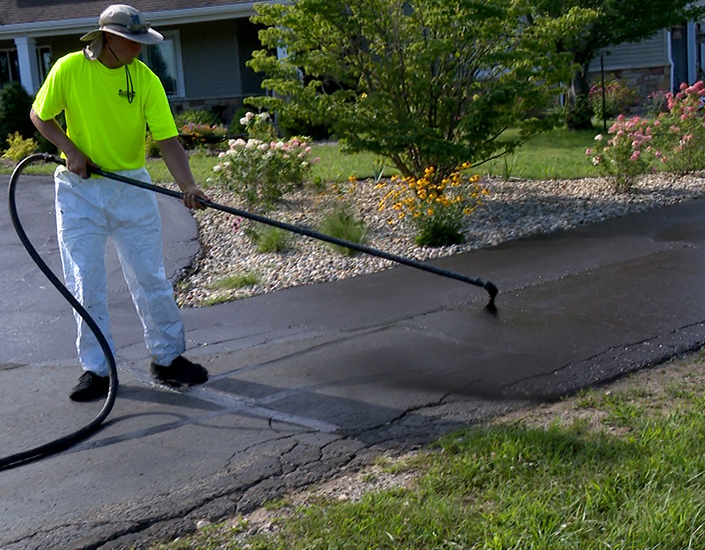Revitalize Angle Parking Lots: Asphalt Sealing Techniques Revealed
Revitalize Angle Parking Lots: Asphalt Sealing Techniques Revealed
Blog Article
Cold Mix Asphalt Vs. Hot Mix Asphalt: Which Is Right for You?

Make-up Distinctions
Cold mix asphalt is generated by emulsifying the asphalt binder with water and an emulsifying representative prior to mixing it with accumulation. The hot mix asphalt manufacturing process involves heating up the accumulation and asphalt binder individually prior to incorporating them at the asphalt plant.
Furthermore, cool mix asphalt often tends to be much less thick and more versatile than warm mix asphalt. This flexibility makes it better fit for areas with greater levels of activity, such as driveways or roadways with rush hour. On the other hand, warm mix asphalt is known for its high toughness and resistance to rutting and cracking, making it a favored option for highways and high-traffic roadways where longevity is important.
Installation Refine Differences
The process of mounting cool mix and hot mix asphalt displays remarkable differences in their needs and treatments. In contrast, hot mix asphalt requires a much more elaborate setup procedure. Due to the heating requirements, hot mix asphalt installments are commonly carried out by specialists with customized equipment, making certain an extra long-term and structurally audio result.
Sturdiness and Durability Elements
When considering asphalt choices, longevity and durability are essential aspects to review for long lasting pavement performance,. Warm mix asphalt (HMA) is known for its outstanding longevity and long life. The high temperature levels throughout the mixing and laying process permit much better compaction, leading to a denser and more powerful pavement framework. This results in HMA being much more immune to hefty web traffic tons, extreme weather, and the effects old contrasted to cold mix asphalt (CMA)
In regards to durability, HMA normally outperforms CMA due to its remarkable strength and resistance buildings. HMA pavements have a longer solution life, needing much less constant repair work and maintenance, which can convert to set you back savings over time. In addition, HMA sidewalks are a lot more quickly personalized to satisfy certain task needs, further enhancing their longevity.
Price Considerations
Considering the financial implications is a crucial aspect when evaluating the choice in between warm mix asphalt (HMA) and cold mix asphalt (CMA) for sidewalk tasks. While the initial expense of warm mix asphalt is typically greater than that of cold mix asphalt, HMA often provides an extra affordable service in the long run due to its exceptional toughness and longevity.
In addition to product prices, it's vital to take into consideration the costs linked with installation and maintenance when comparing HMA and CMA. Inevitably, the important site choice between HMA and CMA ought to take into account not simply the first price yet additionally the lasting monetary ramifications to figure out the most cost-efficient option for the particular pavement task.
Environmental Impact Contrast
Comparison of the ecological impacts between hot mix asphalt (HMA) and cold mix asphalt (CMA) exposes distinct distinctions in sustainability techniques. HMA manufacturing calls for high temperatures, leading to raised energy consumption and greenhouse gas emissions.
Furthermore, the usage of CMA usually involves recycling existing asphalt sidewalk, advertising source conservation and reducing the amount of waste sent to land fills. By choosing for CMA over HMA, roadway building tasks can add positively to ecological preservation efforts.
Verdict
Finally, the selection between chilly mix asphalt (CMA) and warm mix asphalt (HMA) depends on different variables such as structure, installment procedure, sturdiness, long life, cost, and environmental effect. cold mix asphalt. While CMA provides a fast and cost-effective remedy for minor repair work, HMA makes sure exceptional toughness and durability for hefty web traffic areas. Think about these variables very carefully to figure out which sort of asphalt is the right selection for your paving needs

Thinking about the economic implications is a critical aspect when reviewing the choice between warm mix asphalt (HMA) and cool mix asphalt (CMA) for pavement jobs. While the first price of hot mix asphalt is normally greater than that of cold mix asphalt, HMA typically gives a more affordable option in the lengthy run due to its superior longevity and longevity. asphalt patch repair.Contrast of the ecological impacts between hot helpful site mix asphalt (HMA) and cold mix asphalt (CMA) exposes unique distinctions in sustainability techniques.In final thought, the choice between cool mix asphalt (CMA) and warm mix asphalt (HMA) depends on numerous factors such as composition, installation process, sturdiness, long life, price, and ecological influence
Report this page